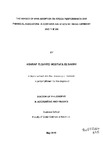Impact of IFRS adoption on stock performance and financial indicators: a comparative study between Germany and the UK
| dc.contributor.supervisor | Pointon, John | |
| dc.contributor.author | Elbakry, Ashraf Elsayed Mostafa | |
| dc.contributor.other | Plymouth Business School | en_US |
| dc.date.accessioned | 2011-05-11T10:51:49Z | |
| dc.date.available | 2011-05-11T10:51:49Z | |
| dc.date.issued | 2010 | |
| dc.identifier | Not available | en_US |
| dc.identifier.uri | http://hdl.handle.net/10026.1/376 | |
| dc.description.abstract |
The compulsory adoption of International Financial Reporting Standards (IFRSs) in Europe has been one of the most important developments in the accounting and finance literature in the last couple of years. IFRSs have promised to provide more accurate and transparent financial statements, and hence to be more value-relevant to investors than local GAAP. Because there are broadly two different accounting systems in force in Europe: the accounting system adopted in common-law countries and the accounting system adopted in code-law countries and because the nature and concept of each accounting system is entirely different, researchers believe that the compulsory adoption of IFRSs in Europe will have different impacts on European countries that fall under each category. The objective of this thesis is to explore the impact of the movement to IFRSs in Europe on share prices, trading volume of shares and financial ratios of listed companies in Germany, as a case study of code-law countries, and the UK, as a case study of common-law countries. Using 8 years of data, which cover the period from 2000 to 2007 and incorporate time periods pre and post IFRSs adoption in Europe, this thesis empirically investigates three main issues. First, it examines whether the adoption of IFRSs has an impact on share prices in the two different environments of accounting systems. Second, the thesis evaluates the impact of IFRSs adoption on financial indicators in the two different environments. Third, the thesis evaluates the impact of the movement towards IFRSs in Europe on the trading volume of shares in the two different environments. For the first issue, several multiple regression models were employed based on Ohlson and modified Ohlson models. The results from the analysis indicate that the adoption of I FRSs was value-relevant in both Germany and the UK, with a greater relative impact in the UK. For the second issue, both univariate and multivariate techniques based on ANOVA tests and different logistic regression models were adopted. Generally speaking, the results from this analysis demonstrate that IFRSs adoption had an impact on some financial indicators and that the impact is higher in Germany than in the UK. As for the third issue, logistic regression was employed to study the pattern of trading volume of stock before and after IFRSs adoption in both Germany and the UK. The results of this analysis showed a great impact of IFRSs adoption on trading volume of shares in both Germany and the UK, with a significantly higher impact in Germany. As such, the thesis makes an important contribution to the value-relevance literature pertaining to the impact of the recent movement to I FRSs in Europe on commonlaw/ UK and code-law/Germany environments in terms of stock performance and financial indicators. A caveat to the finding of this thesis is that the impact of the movement to IFRSs in Europe might need a longer period to be effectively evaluated and that more common-law and code-law countries must be considered to truly reflect the difference in I FRSs impact on both sets of accounting environments. | en_US |
| dc.language.iso | en | en_US |
| dc.publisher | University of Plymouth | en_US |
| dc.title | Impact of IFRS adoption on stock performance and financial indicators: a comparative study between Germany and the UK | en_US |
| dc.type | Thesis | |
| dc.identifier.doi | http://dx.doi.org/10.24382/4148 | |
| dc.identifier.doi | http://dx.doi.org/10.24382/4148 |
Files in this item
This item appears in the following Collection(s)
-
01 Research Theses Main Collection
Research Theses Main


